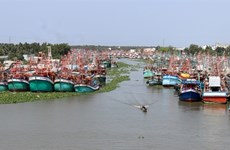Shares gain on brighter economic outlook
National stocks managed to rally last week despite drops in trading with foreign investors as net sellers.
National stocks managed to rally last week despite drops in trading with foreign investors as net sellers.
However, cash poured back during the November 15 session to help indexes rebound.
On the Ho Chi Minh City Stock Exchange, the VN-Index increased 0.6 percent to 501.34 points. The average trading value exceeded 1 trillion VND (47 million USD) on an average volume of 87.2 million shares.
On the Hanoi Stock Exchange, the HNX-Index rose 1 percent to 63.93 points. Trading averaged 320 billion VND and 45.5 million shares per session.
While small-cap stocks rallied around 0.5 percent, large-cap stocks declined at the same rate.
Shares of real estate, construction, mineral and logistics companies continued to attract investor attention early in the week.
Sell-offs occurred during the following sessions as the tumble of blue chips dragged the market down, especially after foreign investors stopped buying and started to sell.
Their net selling value reached 96.7 billion VND last week, weighing on mostly blue chips, including private equity group Masan (MSN), Phu My Fertiliser (DPM) and property developers Vingroup (VIC) and Hoang Anh Gia Lai (HAG).
According to the latest draft on foreign ownership, foreign investors can hold up to 60 percent of a listed company. The draft received a lot of support from investors and was expected to boost investment in the coming time.
Shares increased in 15 out of 24 sectors, led by agriculture and fishery. Notable performers included Song Da Trading and Transport (SDP), up 34.4 percent, textile and garment firm Mirae (KMR), up 20.7 percent, Vietnam Mechanisation Electrification and Construction (MCG), up 16.3 percent and furniture group Duc Long Gia Lai (DLG), up 12.5 percent.
Most of these stocks posted dramatic gains thanks to their financial reports, which showed substantial profits in the first nine months of this year.
Last week, the State Bank of Vietnam also released critical information. Credit growth in the banking system reached 7.18 percent as of October 31, while capital from customers topped 14 percent.
Although the credit growth of 7.18 percent was far below this year's target of 12 percent, it was much higher than last year's rate (3.54 percent).
"So far, economic policies such as controlling inflation for stable money market and GDP growth have shown some effectiveness," said FPT Securities Co analyst Nguyen Van Quy.
"This is an important base to bolster the economy next year," he said.
Securities investment would be more profitable and attractive with this economic scenario, Quy predicted.
Credit institutions held 142 trillion VND in bad debts, accounting for 4.6 percent of total outstanding loans.
The State Bank has identified eight more weak institutions, consisting of two commercial banks and six non-banking entities.-VNA
However, cash poured back during the November 15 session to help indexes rebound.
On the Ho Chi Minh City Stock Exchange, the VN-Index increased 0.6 percent to 501.34 points. The average trading value exceeded 1 trillion VND (47 million USD) on an average volume of 87.2 million shares.
On the Hanoi Stock Exchange, the HNX-Index rose 1 percent to 63.93 points. Trading averaged 320 billion VND and 45.5 million shares per session.
While small-cap stocks rallied around 0.5 percent, large-cap stocks declined at the same rate.
Shares of real estate, construction, mineral and logistics companies continued to attract investor attention early in the week.
Sell-offs occurred during the following sessions as the tumble of blue chips dragged the market down, especially after foreign investors stopped buying and started to sell.
Their net selling value reached 96.7 billion VND last week, weighing on mostly blue chips, including private equity group Masan (MSN), Phu My Fertiliser (DPM) and property developers Vingroup (VIC) and Hoang Anh Gia Lai (HAG).
According to the latest draft on foreign ownership, foreign investors can hold up to 60 percent of a listed company. The draft received a lot of support from investors and was expected to boost investment in the coming time.
Shares increased in 15 out of 24 sectors, led by agriculture and fishery. Notable performers included Song Da Trading and Transport (SDP), up 34.4 percent, textile and garment firm Mirae (KMR), up 20.7 percent, Vietnam Mechanisation Electrification and Construction (MCG), up 16.3 percent and furniture group Duc Long Gia Lai (DLG), up 12.5 percent.
Most of these stocks posted dramatic gains thanks to their financial reports, which showed substantial profits in the first nine months of this year.
Last week, the State Bank of Vietnam also released critical information. Credit growth in the banking system reached 7.18 percent as of October 31, while capital from customers topped 14 percent.
Although the credit growth of 7.18 percent was far below this year's target of 12 percent, it was much higher than last year's rate (3.54 percent).
"So far, economic policies such as controlling inflation for stable money market and GDP growth have shown some effectiveness," said FPT Securities Co analyst Nguyen Van Quy.
"This is an important base to bolster the economy next year," he said.
Securities investment would be more profitable and attractive with this economic scenario, Quy predicted.
Credit institutions held 142 trillion VND in bad debts, accounting for 4.6 percent of total outstanding loans.
The State Bank has identified eight more weak institutions, consisting of two commercial banks and six non-banking entities.-VNA













